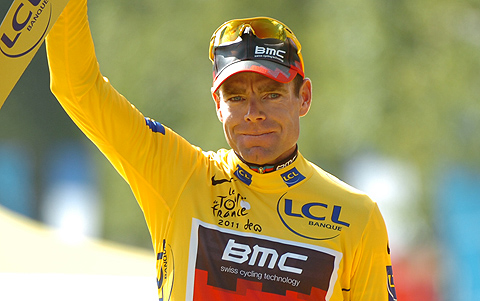To celebrate the 100th anniversary of the first Australians participating in the Tour de France, Cycling Australia has selected a Tour de France team of the century. Unsurprisingly, the team is led by Cadel Evans, the only Australian to have won the world's biggest race.
Generations of Australian cyclists came together in one team in Melbourne on Friday night, with Cadel Evans and Sir Hubert Opperman named in the Australian Tour de France team of the century at the Jayco Cyclist of the Year Awards.
Evans, the only Australian to have won the coveted yellow jersey (2011), was the first rider chosen in the role of the leader for the general classification.
Just like a football team of the century, to recognise the different roles in the sport, the following positions on the nine rider team were selected:
- Two riders for the general classification
- Two key domestiques to support the general classification riders
- One sprinter
- Two leadout men for the sprinter
- One all rounder
- One team captain
Joining Evans as a rider for the general classification is Phil Anderson, who in 1981 Anderson became the first non-European to wear the yellow jersey at the Tour de France.
A five time top-10 finisher, including fifth in 1982 and 1985, Anderson also won the white jersey for the best young rider in the race in 1982.
Anderson has long been considered a cycling pioneer but the man himself is full of admiration for all the Australian Tour riders.
“Fifty Australians have ridden the Tour and I have great respect for all those guys,” Anderson said.
“It would be hard to imagine what Opperman and (Russell) Mockridge did.
“And I couldn’t imagine what it was like for Snowy Munro and Don Kirkham (the first Australians to ride the Tour in 1914). How did they even know about the Tour?
“There’s been a long line of pioneers for different reasons.
“When I packed my suitcase for the first time, to go to Europe, I read Mockridge’s book, My World on Wheels. I read it from cover-to-cover and it was a great insight into the sport and racing in Europe.”
Anderson is credited for inspiring the current generation of Australians, including Richie Porte and Michael Rogers who were selected as the domestiques supporting the general classification riders.
Porte played a key role in supporting Bradley Wiggins and Chris Froome to victories at the Tour de France in 2012 and 2013, as Rogers did with Wiggins in 2012.
Rogers is also a top-10 finisher at the Tour de France, with ninth in 2006.
Not surprisingly, Robbie McEwen was selected as the team’s sprinter.
McEwen’s reign as the world’s best sprinter in the early 2000s included 12 Tour stage wins and taking out the green jersey, the points classification, three times.
The two leadout men chosen to support McEwen were Mark Renshaw and Brad McGee.
Renshaw has long been considered the world’s best leadout man for his work piloting Mark Cavendish to success at the Tour de France.
And McGee, himself a stage winner, prologue winner and holder of the yellow jersey, was the number one teammate guiding Baden Cooke to victory in the race for the green jersey in the 2003 edition of the race.
Simon Gerrans, who has won a mountain-top finish and a sprint stage at the Tour, plus a stint in the yellow jersey, was selected as the team’s all rounder.
And Hubert Opperman, who led the Australian team to the Tour in 1928 and 1931, when he finished twelfth, combined with a 17-year political career, was appointed the team captain.
Anderson said, “It would be great to ride with these guys.”
“When I’m watching the world championships or the Tour de France I can see the mistakes or great things they’re doing and as an ex-rider I feel like I’m there with them.”
The team was selected as a way of celebrating the 100th anniversary of Don Kirkham and Iddo ‘Snowy’ Munro, becoming the first Australians to ride the Tour de France.
Cycling Australia’s anti-doping policy stipulated that riders with doping convictions or who have made confessions were ineligible for selection.
The team:
- Two riders for the general classification – Cadel Evans, Phil Anderson
- Two domestiques to support general classification riders – Richie Porte, Michael Rogers
- One sprinter – Robbie McEwen
- Two leadout men for the sprinter – Brad McGee, Mark Renshaw
- One all rounder – Simon Gerrans
- One team captain – Sir Hubert Opperman
| Thomas BERKHOUT 40 years | today |
| Heinrich BERGER 39 years | today |
| Andre ROOS 22 years | today |
| Simone CARRO 24 years | today |
| Chun Te CHIANG 40 years | today |
© CyclingQuotes.com









